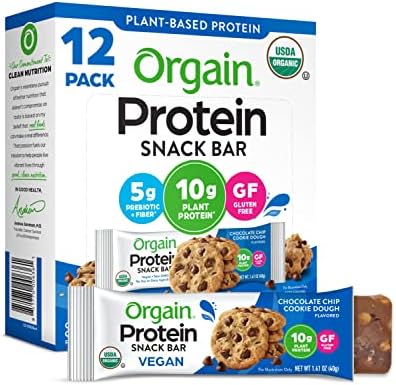forum threadphoinix | Staff posted Today 08:58 AM
Item 1 of 1
forum threadphoinix | Staff posted Today 08:58 AM
[S&S, AC] $7.19: 12-Pack 1.41-Oz Orgain Organic Vegan Protein Bars (Chocolate Chip Cookie Dough) at Amazon (59.9¢ each)
$7.19
$14
48% offAmazon
Get Deal at AmazonGood Deal
Bad Deal
Save
Share




Leave a Comment
1 Comment
Sign up for a Slickdeals account to remove this ad.
Of course. This is an excellent and timely question, as the safety of erythritol has been a topic of significant debate recently.
The short answer is: For the vast majority of people, erythritol is considered safe in moderate amounts, but recent research has raised important questions about potential long-term risks, particularly for heart health.
Let's break down the details, starting with the established consensus and then diving into the newer, concerning research.
---
The Established View: Why Erythritol is Generally Considered Safe
Erythritol is a sugar alcohol (polyol) found naturally in some fruits and fermented foods. It's become a popular sugar substitute because:
· Very Low Calorie: It has about 0.24 calories per gram, compared to 4 calories per gram for sugar.
· Doesn't Spike Blood Sugar or Insulin: It's not metabolized by the body, making it excellent for people with diabetes or on low-carb diets.
· Good for Dental Health: It doesn't feed the bacteria that cause cavities.
· Well-Tolerated: Unlike other sugar alcohols (like maltitol or sorbitol), erythritol is absorbed in the small intestine and mostly excreted unchanged in the urine. This means it's far less likely to cause digestive issues like gas, bloating, or laxative effects, especially when consumed in moderate amounts.
Regulatory agencies have approved it based on extensive short-term studies:
· The FDA recognizes it as GRAS (Generally Recognized As Safe).
· The World Health Organization (WHO) and other international bodies have also approved its use.
For years, the primary caution was about digestive tolerance if consumed in very large quantities (typically more than 50 grams at once for adults, but this varies by person).
---
The New, Concerning Research: A Link to Cardiovascular Events
In early 2023, a landmark study published in Nature Medicine sent shockwaves through the health and nutrition community. The study found a surprising and strong association between erythritol and an increased risk of major adverse cardiovascular events (like heart attack and stroke).
Here are the key findings of that study and subsequent discussions:
1. Association, Not Proven Causation: This is the most critical point. The study found that people with higher levels of erythritol in their blood were at a significantly higher risk for heart-related events. This does not prove that erythritol caused the events, but it shows a strong link that demands further investigation.
2. Potential Mechanism: The researchers proposed a mechanism. They found that erythritol in the blood could make platelets (the cells that form blood clots) more prone to activation and clotting. Blood clots are a primary cause of heart attacks and strokes.
3. The "Chicken or Egg" Problem: The study looked at people already at high risk for heart disease (e.g., older, with diabetes, obesity). It's possible that their bodies produce more erythritol naturally as part of a metabolic dysfunction. When they also consume erythritol as a sweetener, the combined levels become problematic.
4. Rapid Increase in Blood Levels: The study also showed that drinking a single beverage sweetened with erythritol could spike blood erythritol levels to a point that could potentially affect platelet function for several days.
Who Should Be Most Cautious?
Based on the current research, the following groups may want to be particularly careful about erythritol consumption:
· Individuals with existing heart disease or at high risk for heart disease (e.g., those with diabetes, high blood pressure, high cholesterol).
· People with clotting disorders or a history of blood clots.
· Anyone taking blood-thinning medications (like warfarin or aspirin for cardioprotection), as erythritol's potential clotting effect could interfere.
---
Weighing the Evidence: How to Interpret the Contradiction
How can something be "generally recognized as safe" and also linked to heart risk?
· Timing of the Research: The regulatory approvals were based on older, shorter-term studies that focused on digestion and acute toxicity. The new cardiovascular research is recent and highlights a potential long-term risk that wasn't previously investigated.
· Focus of Studies: Early studies ensured it wasn't toxic or carcinogenic. The new study specifically looked at a complex mechanism related to cardiovascular health.
Final Recommendations
1. Moderation is Key: As with most things in nutrition, moderation is crucial. Using a packet of erythritol in your coffee occasionally is very different from consuming multiple diet sodas and keto-friendly processed foods sweetened with erythritol every day.
2. Listen to Your Body and Know Your Risk: If you are in a high-risk group for cardiovascular disease, it is prudent to discuss erythritol use with your doctor and consider limiting your intake.
3. Diversify Your Sweeteners: Don't rely on a single sweetener. If you use sugar substitutes, consider rotating among different types (e.g., stevia, monk fruit, allulose) to avoid high, sustained exposure to any one of them.
4. Prioritize Whole Foods: The healthiest approach is to reduce your overall preference for sweetness, whether from sugar or sugar substitutes. Focus on whole, unprocessed foods.
In summary: Erythritol is not "poison," but it's no longer considered a completely worry-free sweetener. While safe for most people in small amounts, recent high-quality research suggests that high consumption, especially for those at risk for heart disease, could be problematic. It's wise to be informed and cautious.
Disclaimer: This information is for educational purposes only and is not a substitute for professional medical advice. Always talk to your healthcare provider or a registered dietitian for guidance tailored to your personal health situation.
Leave a Comment